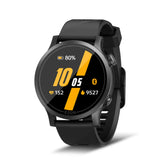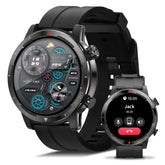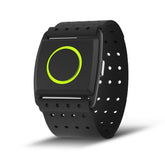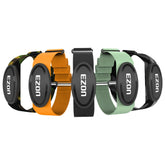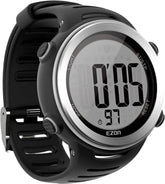Marathon Nutrition Breakdown: Fueling Your Body for the Long Haul
Marathons demand more than physical stamina—they require precise nutritional planning to sustain energy, prevent bonking, and optimize recovery. This comprehensive guide breaks down pre-race, during-race, and post-race nutrition strategies, plus how GPS running watch technology can enhance fuel timing for peak performance.
1. Pre-Marathon Nutrition: Laying the Energy Foundation
A. 3-Day Carb Loading Protocol
- Science Behind It: Glycogen stores peak when consuming 8–10g carbs/kg body weight daily (Journal of Sports Nutrition).
-
Sample Menu for 70kg Athlete:
- Breakfast: 2 cups oatmeal + banana (70g carbs)
- Lunch: Quinoa salad + sweet potato (60g carbs)
- Dinner: Whole-wheat pasta + tomato sauce (100g carbs)
B. Pre-Race Morning Fueling
-
Timing is Critical:
- 3–4 hours before start: High-carb, moderate-protein meal (e.g., bagel with peanut butter, 50g carbs).
- 1 hour before: Quick-digesting carbs (e.g., energy gel + banana, 30g carbs).
- GPS Watch Role: Set alarms for meal times based on race start—e.g., 6 AM race start = 2 AM final meal alert via GPS running watch.
2. During-Marathon Fueling: Sustaining Energy Flow
A. Carbohydrate Timing Strategy
-
20–30g Carbs Every 30 Minutes:
- Use gels, chews, or sports drinks—choose products with 60–80 calories per serving.
-
Electrolyte Balance:
- Consume 200–300mg sodium/hour to prevent hyponatremia (common in >3-hour runners).
B. GPS Watch Fueling Alerts
-
Distance-Based Reminders:
- Program watches to vibrate at every 5K marker for gel intake (e.g., 5K, 10K, etc.).
-
Pace-Adjusted Fueling:
- If pace slows >5%, increase carb intake by 10%—GPS running watch data helps correlate effort with energy needs.
3. Post-Marathon Recovery: Repair and Rebuild
A. 30-Minute Recovery Window
- Nutrient Ratio: 4:1 carbs to protein (e.g., 40g carbs + 10g protein).
-
Ideal Post-Race Snack:
- Chocolate milk (30g carbs, 8g protein) or recovery shake.
B. 24-Hour Recovery Nutrition
-
Glycogen Replenishment:
- 5–7g carbs/kg body weight in first 24 hours (e.g., 350–490g for 70kg athlete).
-
Protein for Repair:
- 1.2–1.7g/kg body weight daily (e.g., 84–119g for 70kg athlete).
4. Common Marathon Nutrition Mistakes
-
Overloading Fiber Pre-Race:
- Solution: Avoid high-fiber foods (e.g., broccoli, beans) 24 hours before the race.
-
Ignoring Individual Tolerance:
- Solution: Practice race nutrition during long training runs—GPS running watch data can log which fuels cause GI issues.
-
Underhydrating During the Race:
- Solution: Drink 150–200ml every 15 minutes; use watch hydration reminders to establish a rhythm.
5. Nutrition Tools and Tech
A. GPS Watch Features for Fueling
-
Customizable Alerts: Set visual or vibration cues for:
- Gel intake (every 30 minutes)
- Hydration stops (every aid station)
- Calorie Burn Tracking: Estimate energy expenditure to adjust post-race nutrition via GPS running watch.
B. Nutrition Planning Resources
| Resource | Use Case |
|---|---|
| Carb Loading Calculator | Determine pre-race carb needs |
| Sports Nutrition Apps | Track daily nutrient intake |
| GPS Watch Data | Correlate fueling with performance |
6. FAQs: Marathon Nutrition Demystified
Q: Should I avoid fats before a marathon?
- Yes, limit fats to <20% of pre-race meal—they slow digestion. Opt for lean proteins and complex carbs instead.
Q: How to prevent bonking during the race?
- Maintain consistent carb intake (20–30g/30min) and use GPS running watch alerts to stay on schedule—bonking often results from missed fuel windows.
Q: Can I rely on race-provided nutrition?
- Supplement with personal favorites—race gels may differ in taste or ingredients. Practice with your go-to products during training.
Fueling the 26.2-Mile Journey
Marathon nutrition is a science of energy optimization—from carb loading to strategic in-race fueling and targeted recovery. By aligning your nutrition plan with GPS running watch timing tools, you’ll eliminate guesswork and arrive at the finish line with energy to spare.
Remember, the marathon is won not just on training runs, but in the meals you eat and the fueling strategy you execute. Plan smart, fuel strategically, and let nutrition be your secret weapon for crossing the finish line strong.
